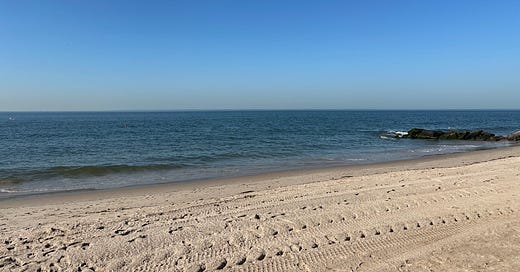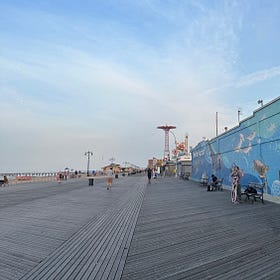Not Just What It's About, but What Literally Happens
a quick note on queries and describing one's work
Greetings from NYC’s heatwave and Zohran Mamdani’s victory!
I highly recommend this interview between agent Alia Hanna Habib and her agent Meredith Kaffel Simonoff. I’ve been thinking about this particular part of Meredith’s answer to ‘what do agents look for in query letters’ for the past week as I’ve done some virtual & in-person one-on-one chats with writers in the final stages of drafting their works.
“Meredith: What I tend to look for most is a kind of perceptible mastery in terms of an author’s ability to talk about their own work…where they're not just thinking about it as an artist, e.g. purely from the inside out, but also have begun to see it as as a reader.”
I do recommend reading the whole interview:
The “perceptible mastery in terms of an author’s ability to talk about their own work” is really what distinguishes a good query from a great query. But this last line, “begun to see it as a reader,” is what I most frequently noticed was missing from these conversations with writers about their WIPs.
Obviously an important caveat/aspect of this is that the writers hadn’t finished writing, so this was often their first time really describing their work to an industry professional and many hadn’t gotten to their ending yet. But I found myself often asking the writers:
“You’ve written/spoken so thoughtfully on what your book is about, thematically, but what literally happens on the page?”
This is thinking about your book as a reader. The plot, the characters’ actions, the stakes.
Try to describe your favorite book to a dear friend. I am particularly fond of an old novel about a woman who goes on a quest to uncover and reveal a conspiracy involving the US postal system after being named executrix of an estate. I could describe this book as “about” the threat of nuclear war, Beatlemania, experimental theater, and conspiracies and distrust of authority in 1960s California. But I don’t think an average reader would pick up the book if I described it that way. What a book is “about” is not very useful for a reader — what happens is.
Pitch your book — the hook, the what happens — the way you’d describe it to someone who you’d want to read it for its actions and not its about-ness. In your query letter there will be room after the one to two paragraph description of “what happens” to describe your themes, your intentions, how you see the book fitting into the marketplace. This big-picture vision is important to establishing one’s mastery and understanding of the form and the industry, but it’s not a complete whole without the strong, clear description of what takes place to whom and why over the duration of one’s work.
I’m featured in Poets & Writers!
“The Next Great Agents: Six Rising Stars on Advocacy, Artistry, and What’s Ahead”
More querying advice:
How to write a query email
Ok so you have written a novel, or a memoir, or a proposal for a nonfiction book. That’s great, it’s hard to do, I’m proud of you. I earnestly believe that writing is a valuable art and practice for its own sake. There is value in accomplishing this goal. But you’re reading this because you want your book traditionally published, presumably, with the help of an agent.
Why aren't agents responding to your query (1)
The goal of each query letter is to get the agent you’ve queried to request the manuscript, whether that’s the full novel, the full memoir, the proposal for the nonfiction project, etc. (Some agents request partial manuscripts; I don’t, personally, if I love a book I’m reading I don’t want to waste time requesting the rest of it.) And then obviously the goal is for that agent (or multiple agents) to offer representation to you for the book.
Stakes without plot
I’m currently reading two contemporary novels and one early 20th century novel that have gotten me thinking about stakes and plot.









"Perceptible mastery..." what a beautifully elegant summary....